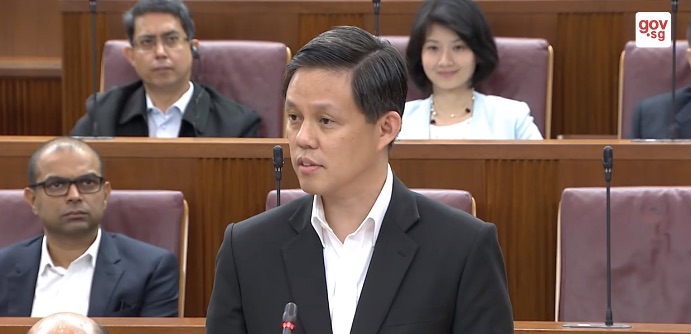In Parliament today (10 Jul), Trade and Industry Minister Chan Chun Sing distributed charts to MPs in the House, showing that the overall inflation rate has been lower in the last 5 years from 2012 to 2017 compared to that of the previous 5 years.
His chart shows that the average overall inflation rate in the last 5 years was only 0.6 per cent a year, lower than the average of 4 per cent between 2007 and 2012. And for this year, the overall inflation is expected to remain low, between 0.5 per cent and 1 per cent, even as rising global oil prices are expected to increase fuel costs and electricity prices, he said.
Minister Chan commented that cost of living is a multi-dimensional issue, and the measure of how prices change over time is but one aspect of it. The gap between people’s aspirations and their ability to fulfil them can also bring cost-of-living pressures to people, he said. That is to say, the minister is implying that if people can choose to have no aspirations, they would then not be feeling any ‘cost-of-living pressures’. He is telling Singaporeans that the high-cost of living felt by them is all inside their ‘heads’.
“Elderly Singaporeans, retirees and their families will be more concerned with healthcare affordability,” he described. “Families with young children and infants may be more concerned with the prices of milk powder and educational programmes. Yet other families may be aspiring to buy their dream house or car.”
“No single measure will express an individual’s ‘cost of living’ pressures fully, given the different needs and wants, the evolving aspirations and the potential gap between aspirations and anticipated means.”
He cited other factors that affect people’s perceptions of living costs, including a changing interpretation of what essential goods and services are for different groups, and the increase in prices of items that are consumed daily – for example, water and transport fares – which may have a disproportionate psychological impact on consumers even if the increases are not the biggest in absolute terms.
“The ‘bunching’ of price increases, like the increases in water and electricity prices this month, can also have a disproportionate psychological impact,” he said.
In any case, he outlined the Government’s strategy to manage the cost of living in Singapore:
- Keeping the economy competitive
- Managing the Singapore dollar
- Diversifying sources of supply for items from food and water to fuel
- Promoting competition to keep prices low
- Managing the cost of doing business
- Focusing on providing help for those with less
- Giving consumers more choices
- Leveraging social enterprises
“We recognise Singaporeans’ evolving aspirations for a better life for themselves and their families, and the associated stress of achieving real income growth in a volatile economic environment,” he assured.
“Beyond creating opportunities for Singaporeans to enjoy real wage growth to meet their aspirations, the Government is also committed to help Singaporeans stretch their hard-earned dollar,” he added.
And to help Singaporeans in the various areas like education, housing, healthcare, transport and among other things, the government would do this through indirect subsidies and means testing, so as to ensure that those with less receive the most help, he said.







